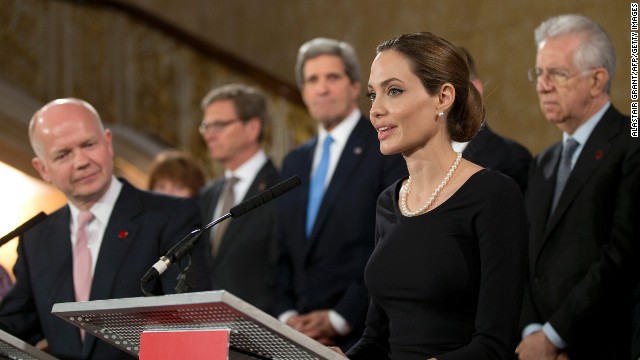Violence Against Women
Source: London (CNN)
"Rape is not a women's issue or a humanitarian issue -- it's a global issue."
So said Hollywood star and U.N. special envoy for refugees Angelina Jolie, standing with foreign ministers from the G8 nations in London as they pledged action Thursday to end sexual violence in conflict.
The Declaration on Preventing Sexual Violence in Conflict, endorsed by the G8 nations -- Canada, France, Germany, Italy, Japan, Russia, Britain and the United States -- commits them to taking greater steps to help the victims of sexual violence in war, prevent further attacks and hold perpetrators to account.
UK Foreign Secretary William Hague said the plans would help end "the horrific use of rape and sexual violence as a weapon of war in conflicts around the globe."
He drew a parallel with the efforts made to end the global slave trade, tackle climate change and agree to an international arms trade treaty -- the last having been achieved just last week at the United Nations
"Today we know the facts about sexual violence in conflict and we have the means to address it, so we must not look away or rest until the world faces up to its responsibilities," he said.
Rape and serious sexual violence in conflict are grave breaches of the Geneva Convention, as well as being war crimes, Hague said. This means states have a responsibility to find those accused of such crimes and bring them to justice.
Under the declaration, the G8 nations agreed to draw up protocols on international standards for the investigation of rape and sexual violence and ensuring access to justice for survivors.
They will work together to raise awareness of the issue, which affects predominantly girls and women but also men and boys.
They also promised to boost support services for the victims, especially children, including health care, legal aid and counseling.
The agreement followed a meeting with the U.N. envoy on sexual violence in conflict, Zainab Bangura.
Together, the nations pledged nearly $36 million in additional funds to help end sexual violence.
Jolie, speaking alongside Hague and Bangura, said the declaration was welcome, but "long overdue" for the survivors of sexual violence.
"For too long, they have been the forgotten victims of war, responsible for none of the blame but bearing the worst of the pain," she said.
"Foreign ministers: Millions of people have been waiting for the commitments you've just made, and they will be watching to see them implemented."
Bangura told how she had recently met victims of sexual violence in the Democratic Republic of Congo and in Somalia.
In DR Congo, she visited a community where, last year, 11 babies aged between 6 and 12 months were raped, she said.
"Faced with such horror, we are compelled to turn the despair in our hearts into unshakeable resolve that this will not happen to our children," she said.
This means ending a culture of impunity for those responsible -- and the governments of the countries where such sexual violence occurs must be part of the solution, she said.
"We have an opportunity like at no time before in history to break the back of this age-old evil," she said.
"Sexual violence in conflict is not inevitable, and preventing it is not impossible."

